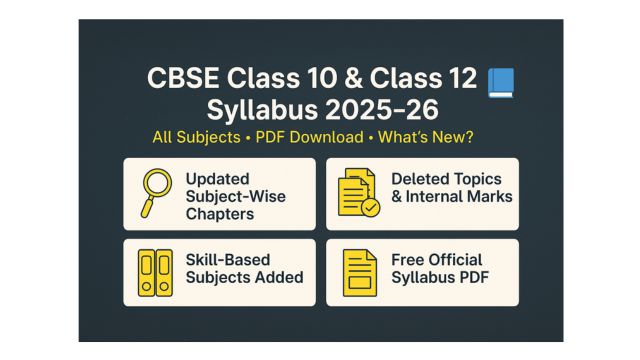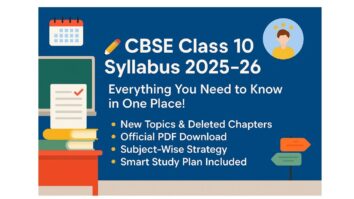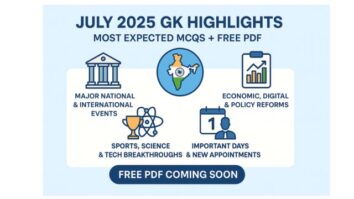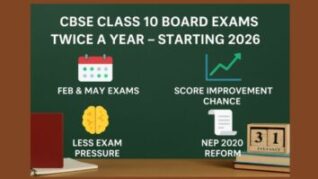What CBSE’s 2-Exam Policy Means for Class 10 & 12 Students: A Bold Move Toward Stress-Free Success
Getting ready to appear for your Class 10 or 12 CBSE board exams in the 2025–26 academic year? Here’s some big news you shouldn’t miss? Big news: CBSE is introducing a two‑exam system per academic year, giving you more flexibility, less stress, and a second chance to boost your marks!
🗓️ What’s Changing?
Starting from the 2025–26 academic year, CBSE will introduce a dual-board exam system for both Class 10 and Class 12 students, offering two opportunities to appear for their board exams within the same session:
- Phase 1 (Feb) – Mandatory for all students.
- Phase 2 (May–June) –is optional and offers students a valuable opportunity to enhance their marks in subjects where they feel improvement is needed..
Here’s how it works:
| Benefit | How It Helps You |
| Less Stress | No more one-shot pressure |
| Score Improvement | Best of two exam scores is counted |
| Multiple Attempts | Improve up to 3 subjects |
| Flexibility for Athletes | Miss Phase 1? Use Phase 2 |
| Winter-Bound Schools | Choose between sessions |
CBSE Exam Controller Sanyam Bhardwaj confirmed:
- Results for Phase 1 announced in April
- Results for Phase 2 out in June
✅ How It Impacts Class 10 Students
- Phase 1 in February is compulsory
- Phase 2 is optional, great for improving those lower scores
- You can improve in up to three subjects (Science, Math, Social Science, Languages)
- If you skip ≥3 subjects in Phase 1, you can’t sit in Phase 2 – you’ll need to repeat the year
- Winter‑bound school students have extra flexibility to pick their preferred exam session
This aligns perfectly with NEP 2020 guidelines on reducing stress and enabling holistic assessment.
✅ What This Means for Class 12 Students
Class 12 students also benefit from the two‑exam model:
- Phase 1 acts as the main board exam
- Phase 2 offers a second chance to improve marks
- Useful for college admission cut-offs – especially for Engineering, Medicine, and Graduation
- Helps reduce failure risks, especially in subjects like Physics or Chemistry
You get:
- Scores from the best session
- Opportunity to retake challenging subjects
- A safety net for high-stakes results season
How the Exam Phases Work
📅 Exam Phases
- Phase 1 (Feb) – mandatory, marking begins results in April
- Phase 2 (May–June) – optional, scoring by June
Both follow the same paper patterns and evaluation rules.
🎯 Victories for All:
- Athletes, exam stress backlogs, special needs—a fair chance
- Best of two results ensures you’re scored fairly
NEP 2020 & CBSE Vision
The NEP 2020 suggests:
- Semester or modular boards
- Low-stakes, repeated assessments to enhance understanding
- Shift away from “once-a-year high-stakes” exams
CBSE is now putting theory into action, focusing on:
- Better mental health for students
- Less coaching pressure
- Encouraging broad, concept-based learning
Must-Know Rules
- Skipping ≥3 subjects in Phase 1? No Phase 2 eligibility
- Phase 2 is only for improvement, not to replace Phase 1
- Results may show both percentages, but only the best score is used
- Internal assessments (practical work, portfolios) are conducted once and shared across both phases
Student Tips
For Class 10:
- Give your best in Phase 1 – it’s mandatory.
- Review mistakes and cover weak topics.
- Take Phase 2 if you need a score boost.
For Class 12:
- Similar strategy but high-stakes subjects may need Phase 2 for cut-offs.
- Plan early: switch exam sessions or boards if needed (NEET, JEE).
Top Benefits
- ✅ Mental peace – one extra chance to score
- ✅ Score cushion – no frantic last-minute cramming
- ✅ Reduced failure risk
- ✅ Aligned with NEP
- ✅ Better result control, especially for Class 12
Sample Study Plan (Feb–June)
| Timeframe | Plan |
| Feb Exam Prep | Finish syllabus + mock tests |
| Apr Review | Get results, analyze mistakes |
| May Revision | Focus on weak areas for Phase 2 if needed |
| June Re‑attempt | Take improvement exam, re‑check answer sheets |
FAQs
Q1: Is Phase 2 mandatory?
A: No — it’s optional for Improvement.
Q2: Can I improve all subjects?
A: You can improve up to three subjects (Science, Maths, Social Science, Languages)
Q3: What if I fail Phase 1?
A: You can attempt Phase 2 if you missed fewer than 3 subjects.
Q4: Do I get two certificates?
A: No—your final marksheet will show your best scores from one of the phases.
Q5: Can I choose different subjects in Phase 2?
A: Yes—improve in subjects you struggled with.
How Schools Handle It
- Schools must offer both exams (Feb & May)
- For winter-bound regions, students may select whichever session suits their school calendar
- Internal marks done once annually and carried forward
What You Should Do Next
- ✅ Talk to your school coordinator about exam registration
- ✅ Prepare for Feb – it’s compulsory
- ✅ Use April–June as revision for weaker areas
- ✅ Decide Phase 2 participation early
- ✅ Stay calm, balanced, and confident
Final Words
CBSE’s decision to bring two board exams per year is a game-changer—you get flexibility, improvement chances, and less stress. Both Class 10 and 12 students will benefit hugely. If used right, this could be the start of less pressure and more mastery.
Download the full PDF version of the official CBSE policy here for detailed rules and exam formats.
All the best! And always remember — Phase 1 is just the warm-up; every mistake is a lesson that leads you closer to success in Phase 2.💪
✅ To get a complete overview of subjects, deleted topics, assessment patterns, and practical guidelines, you can download the CBSE Class 10 Syllabus 2025–26 PDF (All Subjects) here and start planning your exam strategy smartly.





